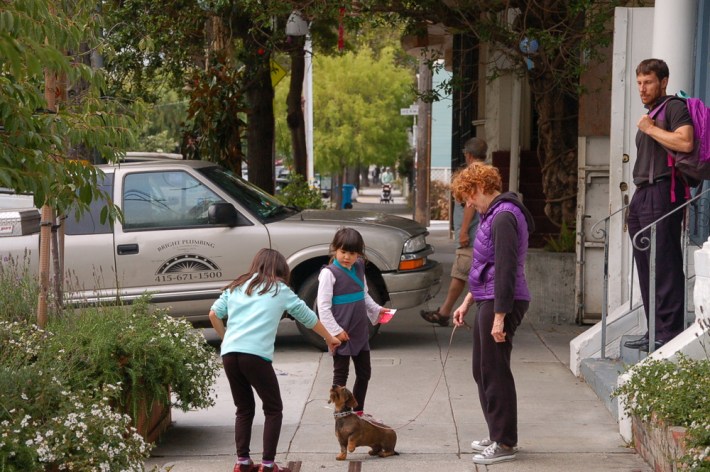How to walk on city streets, and to fear cars while doing so, is something that's taught to small children everywhere. Once those kids grow up and get driver's licenses, however, teaching the same kids to avoid running over other people doesn't seem to be a major part of the curriculum.
It's been generations since the days when streets were places where kids were expected to walk and play, and drivers were held responsible for keeping them safe. These days, nobody bats an eye when the onus for street safety is put onto school children.
A program called "LA Street Smarts," using video games and set simulations of city streets to train kids how to navigate without getting hit by negligent drivers, arrived at Lakeshore Elementary this week to sharpen its students' survival skills. The SF Chronicle reported on the "innovative workshop":
A group of third-graders waved their hands and screamed - "Stop!" - as a car slowly backed toward them from a garage. The children weren't in danger of becoming San Francisco's latest pedestrian casualties, though...
Students began by playing "Ace's Adventure," a video game in which second- and third-graders navigate an avatar through a neighborhood on a virtual walk to school, crossing streets and learning to obey signals.
The youths then took what they learned to a life-size replica streetscape called "Richie's Neighborhood" set up in the school's auditorium. The model is named after former state Sen. Richard Alarcón's 3-year-old son, who was killed in a traffic accident in 1987.
Instructors led the pupils through a series of scenarios designed to teach them when it's safe to cross the street, whom to call for help when chasing a wayward ball, and how to avoid being distracted around traffic.
This program isn't anomalous -- similar traffic safety education programs can be found anywhere. But the great effort invested into it points to the underlying cost of streets that have been designed to move automobiles first, a sacrifice that's long been forgotten in our society.
As pointed out in the Dangerous by Design 2014 report released today by Smart Growth America [PDF], fast-moving cars pose a particular risk to kids:
Children are especially vulnerable to pedestrian injury because their smaller size makes them less visible to motorists. But they are also at risk because their ability to judge the travel speed of oncoming traffic is not yet fully developed. A recent study of perceptions of children aged 6 to 11 found that they lack the ability to detect vehicles moving faster than 20 mph. They don’t see the cars coming.
San Francisco's leaders seem to be picking up on the need to redesign city streets for slower speeds. Sixty percent of pedestrian crashes occur on deadly "arterials" that make up just 6 percent of city streets.
But even as SFPD data shows the vast majority of pedestrian injuries are caused by drivers, there's no comparable education effort in California -- particularly during the inadequate drivers' license training on offer -- to put drivers through simulated games in which they're endangering children.
And traffic violence in SF isn't a result of kids and adults walking around without a healthy sense of fear. Six-year-old Sofia Liu and her family did nothing illegal or dangerous when a driver ran them over in a crosswalk at Polk and Ellis Streets last New Year's Eve, killing Liu.
At a recent hearing, Supervisor Scott Wiener cited a survey which found that unsafe streets were the third most commonly-named reason that families are leaving San Francisco. In one way or another, kids in SF seem to be heeding the message: jump out of the way.






